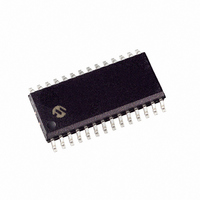DSPIC30F1010-30I/SO Microchip Technology, DSPIC30F1010-30I/SO Datasheet - Page 17

DSPIC30F1010-30I/SO
Manufacturer Part Number
DSPIC30F1010-30I/SO
Description
IC DSPIC MCU/DSP 6K 28SOIC
Manufacturer
Microchip Technology
Series
dsPIC™ 30Fr
Datasheets
1.AC164335.pdf
(286 pages)
2.DM300023.pdf
(22 pages)
3.DM300023.pdf
(18 pages)
4.DSPIC30F2011-20ISO.pdf
(66 pages)
5.DSPIC30F2011-20IP.pdf
(26 pages)
6.DSPIC30F1010-30ISO.pdf
(26 pages)
7.DSPIC30F1010-30ISO.pdf
(50 pages)
8.DSPIC30F4011-20IML.pdf
(236 pages)
Specifications of DSPIC30F1010-30I/SO
Core Processor
dsPIC
Core Size
16-Bit
Speed
30 MIPs
Connectivity
I²C, IrDA, LIN, SPI, UART/USART
Peripherals
Brown-out Detect/Reset, POR, PWM, WDT
Number Of I /o
21
Program Memory Size
6KB (2K x 24)
Program Memory Type
FLASH
Ram Size
256 x 8
Voltage - Supply (vcc/vdd)
3 V ~ 5.5 V
Data Converters
A/D 6x10b
Oscillator Type
Internal
Operating Temperature
-40°C ~ 85°C
Package / Case
28-SOIC (7.5mm Width)
Data Bus Width
16 bit
Processor Series
DSPIC30F
Core
dsPIC
3rd Party Development Tools
52713-733, 52714-737, 53276-922, EWDSPIC
Development Tools By Supplier
PG164130, DV164035, DV244005, DV164005, PG164120, DM240002, DM300023, DM330011
Package
28SOIC W
Device Core
dsPIC
Family Name
dsPIC30
Maximum Speed
30 MHz
Operating Supply Voltage
3.3|5 V
Number Of Programmable I/os
21
Interface Type
I2C/SPI/UART
On-chip Adc
6-chx10-bit
Number Of Timers
2
Lead Free Status / RoHS Status
Lead free / RoHS Compliant
For Use With
DM300023 - KIT DEMO DSPICDEM SMPS BUCKDV164005 - KIT ICD2 SIMPLE SUIT W/USB CABLE
Eeprom Size
-
Lead Free Status / Rohs Status
Lead free / RoHS Compliant
Available stocks
Company
Part Number
Manufacturer
Quantity
Price
Company:
Part Number:
DSPIC30F1010-30I/SO
Manufacturer:
Microchip Technology
Quantity:
135
Part Number:
DSPIC30F1010-30I/SO
Manufacturer:
MICROCHIP/微芯
Quantity:
20 000
44. Module: PSV Operations
© 2010 Microchip Technology Inc.
An address error trap occurs in certain addressing
modes when accessing the first four bytes of a
PSV page. This only occurs when using the
following addressing modes:
• MOV.D
• Register Indirect Addressing (Word or Byte
Work around
Do not perform PSV accesses to any of the first
four bytes using the above addressing modes. For
applications using the C language, MPLAB C
Compiler for dsPIC DSCs (formerly known as the
MPLAB C30 C Compiler), version 3.11 or higher,
provides the following command-line switch that
implements a work around for the erratum.
-merrata=psv_trap
Refer to the readme.txt file in the MPLAB C
Compiler for dsPIC DSCs for further details.
Affected Silicon Revisions
A1
mode) with pre/post-decrement
X
A2
X
A3
X
45. Module: Sleep Mode
dsPIC30F1010/202X
Execution of the Sleep instruction (PWRSAV #0)
may cause incorrect program operation after the
device wakes up from Sleep. The current
consumption during Sleep may also increase
beyond the specifications listed in the device data
sheet.
Work arounds
To avoid this issue, any of the following three
workarounds can be implemented, depending on
the application requirements.
Work around 1:
Ensure that the PWRSAV #0 instruction is located
at the end of the last row of Program Flash
Memory available on the target device, and fill the
remainder of the row with NOP instructions.
This can be accomplished by replacing all
occurrences of the PWRSAV #0 instruction with a
function call to a suitably aligned subroutine. The
address( ) attribute provided by the MPLAB
ASM30 assembler can be used to correctly align
the instructions in the subroutine. For an
application written in C, the function call would be
GotoSleep( ). For an assembly language
application,
CALL _GotoSleep.
The Address Error Trap Service Routine software
can then replace the invalid return address saved
on the stack with the address of the instruction
immediately
GotoSleep( ) function call. This ensures that
the device continues executing the correct code
sequence after waking up from Sleep mode.
Example 2
described above, as it would apply to a
dsPIC30F2023 device.
demonstrates
the
following
function
the
the
_GotoSleep
call
DS80445D-page 17
work
would
around
be
or























